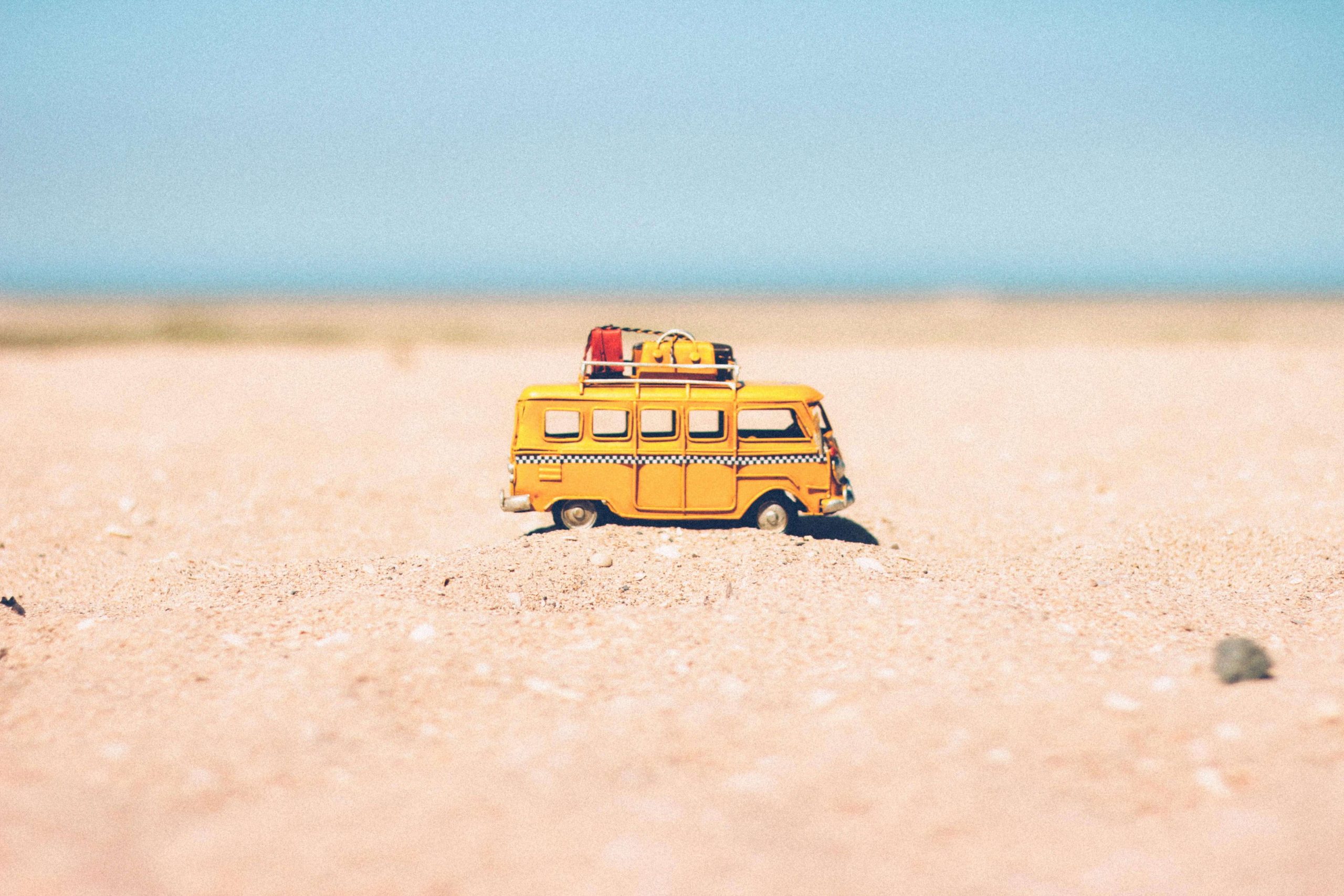
Travel has made its comeback
This summer, travel made its big comeback!
# 1 Industry overview: A notable (and remarkable!) return to the field
# 2 Purchasing journey: The right tactics to convert
# 3 Summer review and lessons: Covid summer #2, what are the takeaways?
# 4 Strategic audiences: What tools to focus on for the coming seasons?
# 1 Industry overview: A notable (and remarkable!) return to the field
2021 has been a decisive year because it was the year internet users started looking at travelling again. Whether it’s a true desire or existential question, we don’t really know, but internet searches have risen!
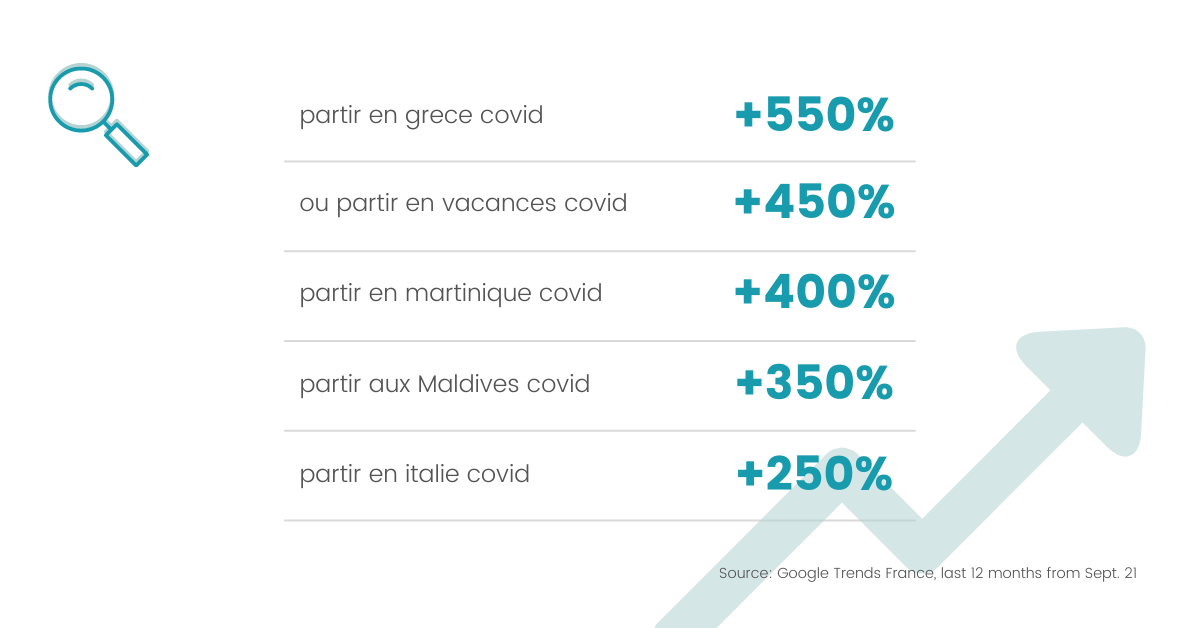
Internet users are wondering about travel inspiration and destinations. The majority of travel-related searches focus on: where to go on holiday during COVID?
There is a desire among internet users to travel within this context.
2021 marks a decisive turning point in the travel sector, we can see a before and after in the way internet users travel:
- Administrative: requests concerning the European health passport which did not exist a few months ago. However, it is now a tool for the majority of people travelling this summer.
- Interest in travel: travel related searches have never been higher over the past 3 years.

Between 2019 and the summer of 2021, searches on travelling and tourism increased by 13% in France.
86% interest in France as a destination for the French, the rest is shared between Europe (12%) and the rest of the world (2%).
This domestic trend remains the majority worldwide with a few exceptions such as Greece:
Domestic tourism or staycations took the majority share:

This summer in France:

# 2 Purchasing journey: The right tactics to convert
Capturing user demand as well as possible requires understanding how the internet is used.
For now, industry trends remain volatile and consumer behavior as well. But what is certain is that consumer behavior is becoming increasingly digitized.
Travelers use search engines at different stages of research:
- Discovery
- Research
- Purchasing journey
The growth of travel-related queries means that they now exceed the pre-COVID query volume in Europe and America.
In this highly evolving context, search campaign automation solutions are excellent allies to:
- Navigate the turbulent market dynamics,
- Capitalise on the instant insights and signals captured by Google Search,
- Profitably optimise the performance of your campaigns.
Essential solutions to continue attracting travelers
Be present on all relevant searches: using the Destination Insights tool, and analyzing search terms. You can use Dynamic Search Ads to capture emerging demand.
User experience:
Today, internet users’ behavioral trends are becoming almost unpredictable, and their relationships with brands are more volatile. Your presence on search gives you the opportunity to be present when users need you, and to offer them an initial convincing experience.
- Beyond a performance lever, you have to think of search ads as a virtual showcase for your business.
- Adding the images extension can increase your CTR (click through rate) by 10%, whether they’re dynamic or not.
- Make search a profitable lever, make sure that your search campaigns are well aligned with your business objectives. Use smart bidding strategies to maximise the value of your conversions.
Purchasing journey: returning to the right tactics to convert
1 – Exposure: for example this summer, the decrees and laws impacting our local and international mobility.

2 – Exploration: the exploration phase is the moment when the internet user searches for a destination.
Today 50% of internet users plan to book their holiday less than a month in advance.

Travelers therefore expect a certain flexibility, ease, and spontaneity, which should not be neglected.
3 – Evaluation: this is the time for the final decision. The most influential factors in Europe are: price, offers and deals.

These factors even dethrone concerns about health and safety. We are now back to a form of normality.
4 – Purchase: Google has seen an explosion in requests for holiday vouchers. Some requests were specifically made to certain players in the travel sector such as Abritel, Ulys or even Airbnb.
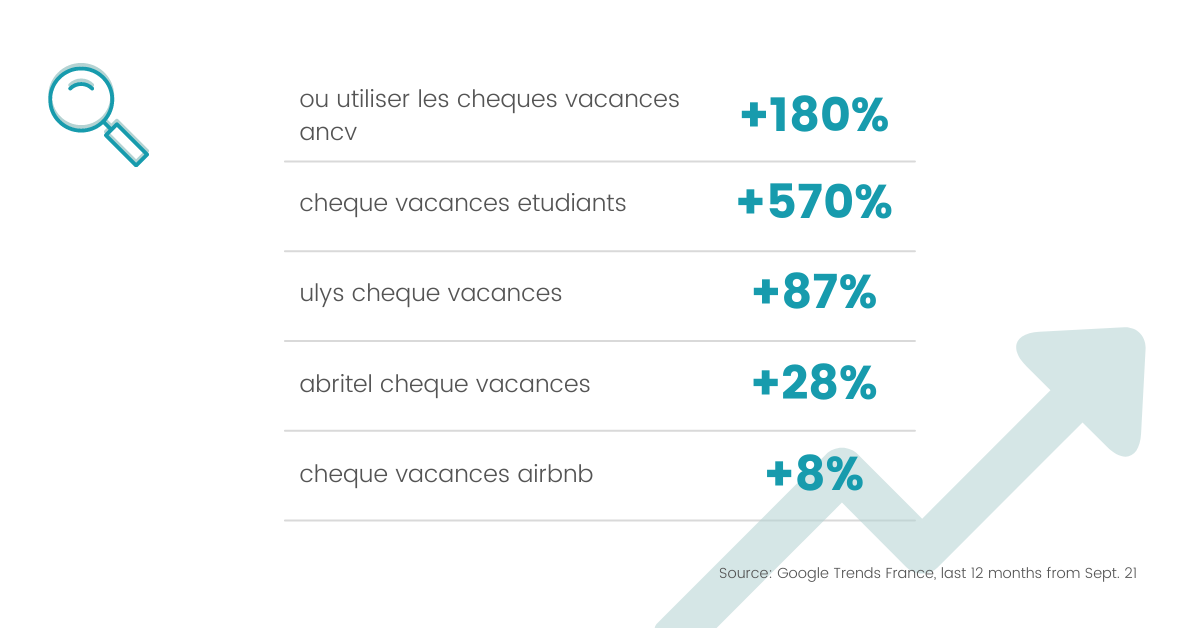
It is therefore important to indicate whether these alternatives exist during the purchase process, in the right place and at the right time.
5 – Experience: the experience of the transaction and the moment. This experience comes back through the cycle of exploration and evaluation.
Google has noted a particular desire for local tourism:

Requests in France were very focused on this:
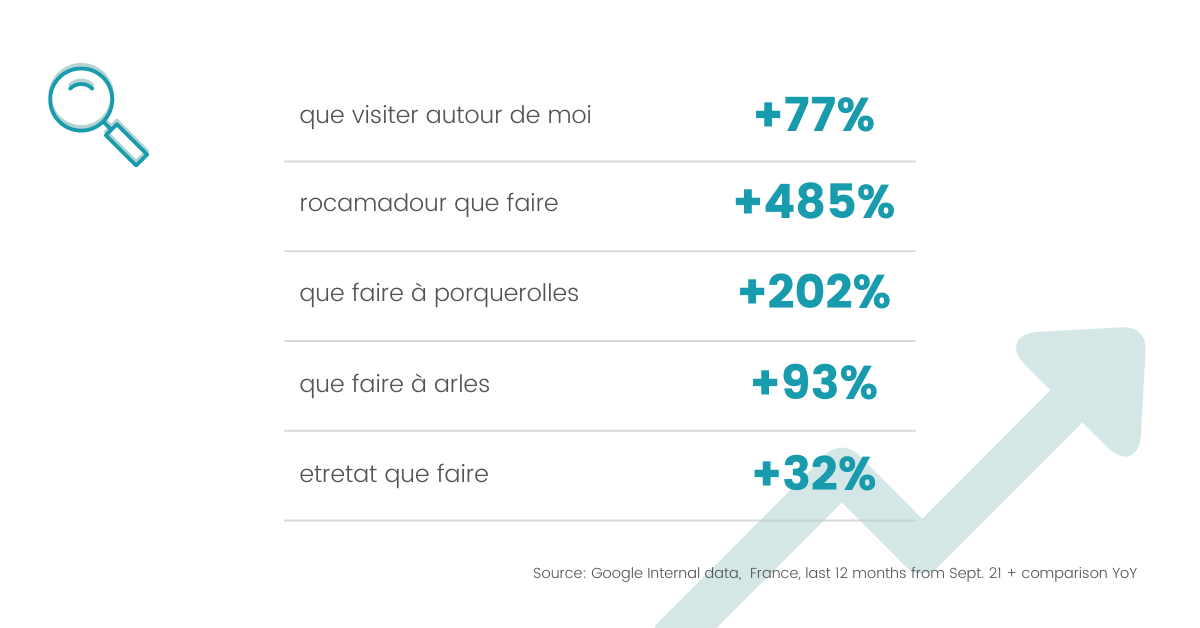
These expectations of support for internet users are an integral part of the purchasing journey.
Google has discovered that the entire purchasing journey around these 5 fundamental blocks is carried out on a mobile device.

The mobile purchasing journey is therefore a crucial issue for 2021.
In 2021, the majority of traffic on websites dedicated to travel has been via smartphone. However, conversion rates on mobiles are 2.5x lower than on desktops. This is a sign that the travel industry is still lagging behind in delivering mobile experiences that are as good on smartphones as they are on desktops.
Providing travelers with an optimized, quick, intuitive mobile experience can set you apart from the competition, and, above all, increase your income.
# 3 Summer review and lessons: Covid summer 2, what are the takeaways?
Proximity, was it a default choice? Freedom to travel this summer was still limited. This was felt in the desire and ability to travel within France and beyond its borders.
This summer’s searches for people living in France were mainly based in France, and its main cities:

When we look at more distant destinations, we see a significant decrease in the number of requests compared to the previous year:
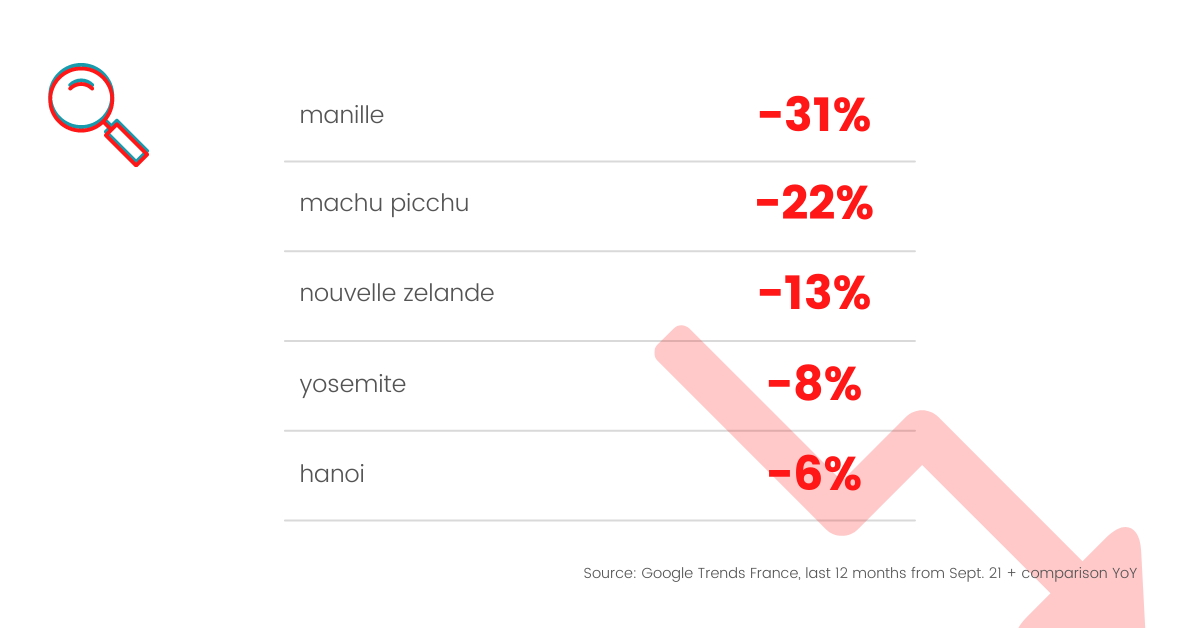
These limits have changed travelers’ behavior. In France, searches to find an idea for destinations have seen an ongoing increase:

France has turned out to be an ideal destination. Travelers have gone from Globe Trotters to France Trotters.

This summer also saw camping make a comeback. Google has noticed an increase in requests for this type of accommodation.
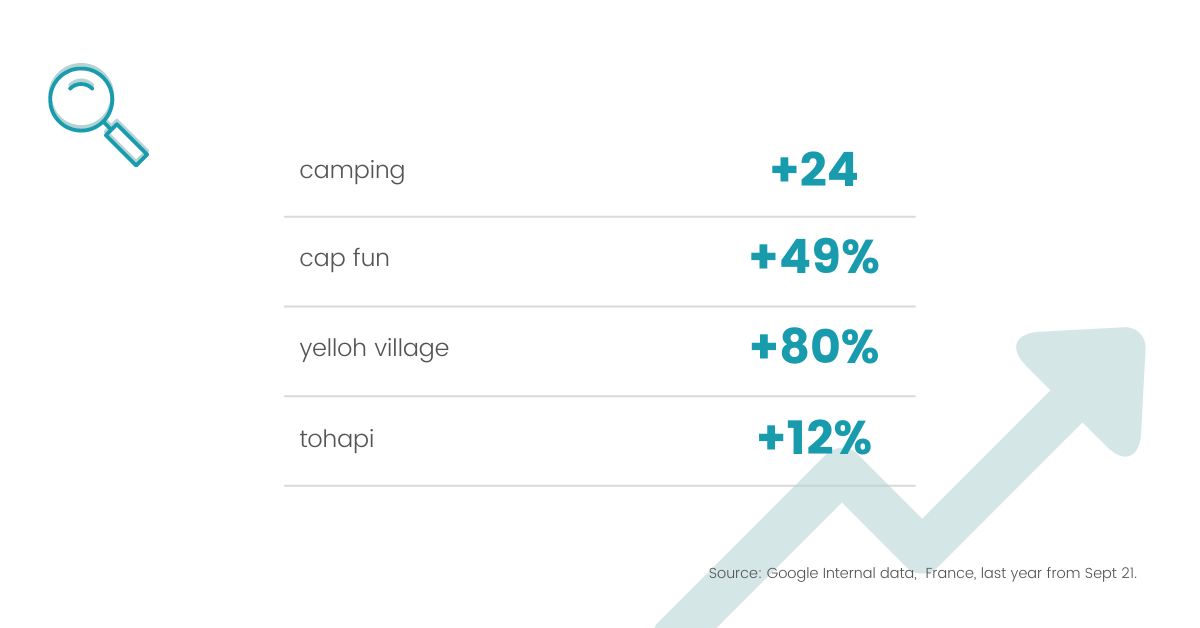
Google has observed 4 major changes in travelers’ behavior following the health crisis:
- Proximity was a default travel choice.
- The seasons have been deconstructed.
- Travelling by road has been favored.
- The return of the campsite as a type of accommodation.
# 4 Strategic audiences: What tools to focus on for the coming seasons?
It is important to be connected with your audience, Google has shared 4 key audiences for the travel sector:
- Hedonists: travelers who have expectations of pleasure, where you have to experience something exhilarating and surprising.
- Family first: attach importance to the destination and organizing the trip.
- Curious adventurers: attach importance to solo travel.
- Virtuous travelers: attach importance to better travel and eco-tourism.
For Google, hedonists and family firsts are the obvious audiences. These audiences are already known and so are the levers to reach them.
The curious adventurers and the virtuous travelers are audiences under construction. So, you need to get to know them better to offer a personalized approach.
If you would like to discuss future distribution, please contact our team. We would be delighted to help you!